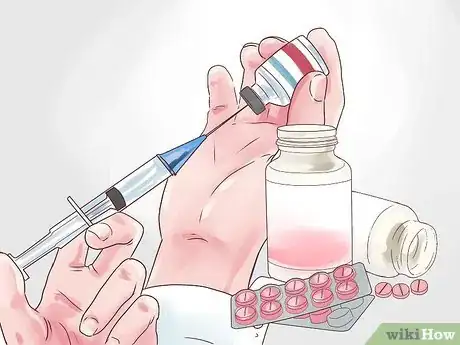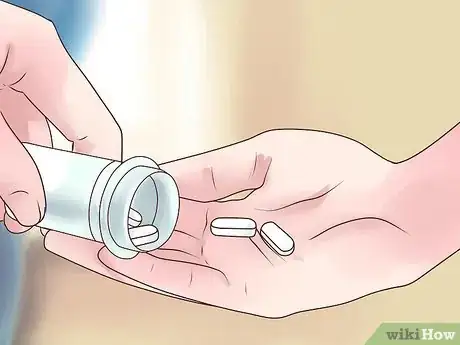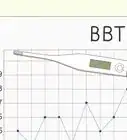This article was co-authored by Carrie Noriega, MD. Dr. Noriega is a Board Certified Obstetrician & Gynecologist and medical writer in Colorado. She specializes in women’s health, rheumatology, pulmonology, infectious disease, and gastroenterology. She received her MD from the Creighton School of Medicine in Omaha, Nebraska and completed her residency at the University of Missouri - Kansas City in 2005.
There are 35 references cited in this article, which can be found at the bottom of the page.
This article has been viewed 45,454 times.
Getting pregnant can be stressful. On average, it takes six months to conceive for women under 35. If you're older than 35, conception may take over a year.[1] The good news is there are many things both men and women can do to increase their chances of successfully conceiving a child. For starters, track your menstrual cycle to figure out your fertile peak during the month. You can also make certain lifestyle changes, like altering your diet, that may boost fertility. There are also damaging behaviors, like smoking and drinking, you should cut out to make pregnancy more likely. With some diligence and time, you can increase your chances of successfully getting pregnant.
Steps
Tracking Ovulation
-
1Track your period for a few months. Each month, your ovaries release an egg that travels into your fallopian tubes. This is called ovulation and conception occurs in the days leading up to ovulation. The egg is fertilized by sperm and attaches itself to your uterine wall. As ovulation occurs about halfway through your menstrual cycle, tracking the natural flow of your periods can help you get an idea of your fertile window.
- Mark when your period begins each month. our menstrual cycle begins on the first day of menstrual bleeding. It ends the day before your next period occurs. Menstrual cycles vary, but on average are between 21 and 35 days.[2]
- In general, ovulation happens around day 14 of your menstrual cycle. You can try having sex more frequently in the week leading up to the 14th day of your menstrual cycle. It's likely that, during this time, your body is preparing to ovulate. Sexual activity during this time can increase the chance of an egg getting fertilized.[3]
- You can use an online ovulation calculator through many medical websites that will help you figure out your fertile days. Usually, you'll enter the start dates of your last few periods. The calculator will then give you an estimate of your most fertile cycle days for the coming months.[4]
- If you notice your periods vary in length greatly, or you skip periods some months, talk to your doctor before attempting to get pregnant. Medical conditions like polycystic ovarian syndrome (PCOC) can affect the menstrual cycle and you may need medical guidance to conceive.
-
2Look for changes in cervix mucus. Unfortunately, figuring out when you'll ovulate is an inexact science. While the 14th day is a good guess, many factors can affect your hormone levels and, in turn, ovulation. You should also look for changes in your cervix mucus, which is the fluid naturally discharged from your vagina. Just before ovulation, many women notice a change in this fluid.[5]
- If you gently wipe around your vagina each time you use the bathroom, you can watch for a change in mucus. The vagina produces a variety of mucus all the time, usually clear or white in nature. In addition to tracking your menstrual cycle, start paying attention to your normal vaginal secretions each day.
- When ovulation gets close, secretions will be clear and slippery. You may also notice you're producing more secretions than usual. Many women find these fluids look something like raw egg whites. After ovulation has occurred, making conception that month unlikely, discharge will lessen and become cloudier and thicker.[6]
Advertisement -
3Measure your basal body temperature. Your basal body temperature is the temperature of your body when it's at rest. It can be measured with a special thermometer you can purchase at most drug stores. During ovulation, basal body temperature rises by about 0.2 to 0.5 degrees.
- Take your basal body temperature every morning the moment you wake up — before getting out of bed or moving around. Keep a note on a notepad on your bedside table or on your smartphone. It can be helpful to write your temperature on a graph, as this can allow you to see a pattern each month. The graph may suddenly spike upward for a few days. These are the days you are probably ovulating.[7]
- You may eventually see a pattern emerging. You may notice, for example, during the 16th and 17th day of your cycle, your basal temperature rises. The best time to conceive would be the days lead up to this temperature spike. You could increase your chance of pregnancy by aiming to have sex on the 14th and 15th day of your cycle.[8]
-
4Consider an over-the-counter ovulation kit. Certain hormones surge when you are ovulating. You can buy an over-the-counter ovulation kit at a local drugstore. These kits detect hormones in your urine, identifying the most likely time you are ovulating. Some tests may also detect a surge in hormones that occurs just before ovulation. You can purchase an ovulation kit to identify at which points in your cycle you will be most likely to conceive.[9]
- How you use an ovulation kit varies by brand. In some kits, you pee on a stick, as you would with a pregnancy test. In other kits, you can take a small sample of saliva from the inside of your mouth. After a certain amount of time has passed, you should see a reading that indicates whether or not you're ovulating.
-
5Watch for other physical signs of ovulation. As stated, figuring out ovulation is inexact. Sometimes, just paying attention to your body can help you identify when you're ovulating. In addition to changes in vaginal fluids, you can watch for some of the following signs that may indicate you're ovulating:[10]
- Light spotting
- Slight cramping
- Tenderness in the breasts
- Bloating of the abdomen
- Increased sex drive
- A heightening of certain senses, like taste, sight, and smell
Making Lifestyle Changes
-
1Maintain a healthy diet. Research does not point to one specific diet that increases fertility; however, getting your body as healthy as possible can up your chances of conceiving and prep for a healthy pregnancy. Go for a diet rich in lean protein, fruit, vegetables, healthy fats, and whole grains.[11]
- For starters, up your fruit and vegetable intake. Consuming a lot of plants is great for your overall health. Keep baby carrots, berries, and things like apples and oranges on hand for snacks. Try to have a salad before every meal. Go for vegetable-based side dishes, like grilled broccoli or asparagus.[12]
- Go for non-starchy grains. Opt for whole wheat bread and pasta over white bread and pasta. Choose brown rice instead of white rice. In terms of protein, go for lean options like fish and lean poultry. You can also get some protein from low-fat dairy products, like low-fat cheese and milk.[13]
- Limit your consumption of sugar. Products with added sugar really do nothing for a balanced diet. It may be a good idea to cut sugar out, for a variety of reasons; however, if you have a sweet tooth, work on indulging it in moderation. Only have dessert a few nights a week. Stick to mini-sized candy bars over the larger variety. Go for diet soda over regular.[14]
-
2Get to a healthy weight. Women who are overweight or underweight may have increased difficulty conceiving. Getting to a healthy weight can increase your chances of pregnancy.[15] A healthy weight is defined as a BMI between 18.5 and 24.9. You can calculate your BMI using a height/weight chart, an online calculator, or having your doctor assess your BMI. If your BMI does not fall within the above range, you may need to gain or lose weight.[16]
- Overweight and underweight women struggle to conceive and may be prone to further complications during pregnancy. If your BMI is below 18.5, or 25 or above, you should talk to a doctor about how to get on track to a healthier weight. Weight loss or gain should usually be supervised by a physician. If you're planning on getting pregnant, seeing a physician regularly is a good idea anyway.[17]
- In general, to gain weight you would increase your caloric intake while lowering your rate of exercise. To lose weight, you would decrease your caloric intake while increasing your amount of exercise each day. If you're a woman of childbearing age, you should be eating between 1,800 and 2,400 calories a day. You can count calories by hand, looking up the number of calories in your favorite food online. There are also many smartphone applications that count calories for you when you enter the food you eat each day.[18]
- Weight loss or gain should be a slow process. For healthy, sustainable weight loss or gain, do not aim to gain or lose more than 1 or 2 pounds each week. While that number sounds small, if you're diligent with your exercise and eating habits, you'll be surprised how quickly your weight loss or gain adds up. This can be achieved by cutting out 500 calories a day.
-
3Have sex regularly. In order to conceive, regular sexual activity is important. If you're having sex one to two times a week, you should eventually hit a fertile point in your cycle and conceive. You can greatly increase your chances at conception by having sex once a day in the days leading up to ovulation.[19]
- If you and your partner have a busy schedule, making time for sex can sometimes be difficult. After a long day, it can be hard to get into the mood. Try to incorporate a pre-sex ritual into your routine. Turn off all electronics, go into the bedroom alone, and try to play some romantic music or light a candle.[20]
- Make sex a priority. Many couples get caught up in a variety of responsibilities and regular sex falls to the wayside. While it may seem non-romantic to schedule sex, many couples find it helps them maintain regular intimacy. Try to block off an hour or so each day for sex with your partner.[21]
-
4Lower your stress level. The evidence on stress's effect on fertility in and of itself is still inconclusive. Some studies, however, do indicate a lower overall stress level may have a positive impact on fertility.[22] Regardless of the precise effect of stress on pregnancy, it's a good idea to work on lowering your stress when trying to conceive. High stress can affect you ability to eat right and exercise regularly. You may also be more likely to drink alcohol when stressed and may have a lower sex drive. This can all inhibit your ability to live a lifestyle that promotes fertility.
- Engage in practices like yoga, deep breathing, mindfulness, and meditation. These activities help you keep your mind in the present moment, preventing anxiety from disrupting your thoughts. You can take meditation or yoga classes at a local community center. You can also find guided routines online.
- Practicing basic self care can also help reduce stress. Try to get in at least 20 minutes a day of physical exercise, like a light walk or jog. Eat three well-balanced meals per day and two light snacks to avoid feeling hungry. Get at least eight hours of sleep a night.
- If you are having trouble regulating your stress, you may have an underlying anxiety disorder that's preventing you from relaxing. Talking to a therapist may help. You can find a therapist by finding a list of providers through your insurance. You can also ask your regular physician for a referral.
Raising Sperm Count
-
1Keep cool. Making sure you have a stable, healthy sperm count can increase your chances at getting your partner pregnant. Some studies indicate high temperatures around the scrotum can affect sperm production. Take measures to keep your groin cool to increase your chance at pregnancy.[23]
-
2Eat a diet rich in fruits and vegetables. Like women, men can increase their fertility by eating a healthier plant-based diet. The antioxidants found in fruits and vegetables may help sperm stay healthy. Try to snack on fruits and veggies throughout the day. Have a salad before dinner and vegetable or fruit based side dishes. Try skipping dessert a few nights a week in favor of fruit for a sweet after dinner treat.[26]
-
3Exercise. Moderate physical activity may help increase sperm count. Try to incorporate some light walking, jogging, or biking into your daily routine. You could, for example, ride your bike to work instead of walking each day. You could also make a point of taking your dog for a long walk before bed each night. All of this can potentially increase your sperm count.[27]
-
4Watch your exposure to toxins. Toxins found in pesticides and household products may have an effect on sperm count. If you work a job, like construction, that requires you to work with toxins, take preventative measures. Always wear protective clothing to prevent skin contact with chemicals.[28]
-
5Get a sperm count. If you and your partner are struggling to conceive, consider seeing a fertility doctor to have a sperm count done. You will provide a semen sample, which will be medically tested to count the sperm. A sperm count lower than 15 million per milliliter of semen is considered low.[29]
- Do not panic if your sperm count is low. There are many medical treatments, such as taking hormones and surgical options, that can correct a low sperm count. You will have to talk to your doctor to see which options are right for you given your medical history and current health.[30]
Seeking Medical Care
-
1See a doctor before trying to conceive under certain circumstances. Most couples can safely try to conceive on their own for up to a year before consulting a doctor; however, in certain cases you should see a physician before attempting to have a child.
- If you're over 35, fertility does decrease during this time. You are also at increased risk for a miscarriage or other complications during pregnancy. If you're over the age of 35, make an appointment with your doctor. Your doctor will perform a basic exam and talk you through some of the unique risks and challenges you face getting pregnant at your age. They may also provide you some tips on how to conceive safely.[31]
- If you have a condition that inhibits fertility, like PCOS, you should make an appointment with your doctor. They can provide you with insight on how to get pregnant safely. You should also see a doctor if you suspect you have a fertility issue. For example, if your menstrual cycle is inconsistent, you may want to have your doctor perform some tests to assess your fertility.[32]
- If you discover you have a fertility issue, do not panic. Many fertility issues are treatable with medication or surgery. You doctor may recommend you see a fertility specialist, depending on your issue. Many couples are able to overcome fertility issues and go on to have healthy babies.[33]
-
2Get screened for sexually transmitted infections. Sexually transmitted infections are diseases transmitted through sexual intercourse. STIs can affect fertility in both men and women if they go untreated. If you and your partner have not already been tested for STIs, get tested before attempting to conceive. Most STIs are curable and you should make sure you're STI-free before trying to have a baby.[34]
-
3Consider preconception planning. If you're in your early 30s, seeing a doctor is not necessary unless you've been trying for a baby for over a year; however, many couples find it helpful to talk to their doctor ahead of time. Preconception planning allows your doctor to assess your overall health and give you advice on how to best conceive.[35]
- Your regular doctor may be able to give you a preconception planning appointment; however, they may also refer you to a gynecologist or OBG/YN. At a preconception appointment, you will get a basic physical exam and your doctor will ask you about your lifestyle and medical history.[36]
- Your doctor will then recommend any changes you can make to have a healthier overall lifestyle, increasing your chance of getting pregnant. For example, your doctor may suggest a slight change in your eating or exercise habits.[37]
- If you or your partner has a health issue, preconception planning can be particularly helpful.[38]
-
4Review your medications. Some medications can reduce fertility. Even vitamin supplements may have some affect on your hormones, decreasing your chance at conception. Go through your medicine cabinet and review all the medication you take regularly, including over-the-counter pills. If you notice anything on the label about a decrease in fertility, consider switching to a different type of medication.[39]
- When trying to conceive, you should ask your health care provider before trying any new medications. Even over-the-counter medications may interfere with conception or cause complications after a baby is conceived.[40]
Minimizing Damaging Behaviors
-
1Quit smoking. For both men and women, smoking tobacco products can affect fertility. If a woman smokes during pregnancy, or is around secondhand smoke, the baby's health could be affected. If a man smokes, he can damage his sperm. If you smoke, you should both quit as you try to conceive.[41]
- Talk to your doctor about quitting. Tobacco is highly addictive and trying to quit without medical help can be difficult. Your doctor can help you form a plan to taper off tobacco. They may also recommend products, like nicotine gum, that can help you quit.
- Seek support when quitting smoking. Quitting smoking is incredibly difficult and you'll need lots of support. Ask friends and family members to support your decision. You can also see if there are any support groups at your local hospital. If you can't find a support group in your area, you can look online.
-
2Avoid alcohol. Drinking alcohol can decrease your fertility. If you conceive, drinking alcohol can hurt the developing fetus. When trying to get pregnant, it's best to refrain from alcohol consumption completely.[42]
- If you're a regular drinker, quitting may be challenging. You may be accustomed to having a glass of wine with dinner, for example, or having drinks with friends on Fridays after work. Consider giving yourself a month to cut back on alcohol before trying to conceive.
- Many social events revolve around drinking. These events can be awkward if you're not partaking, and you may not feel ready to tell others why you're cutting back on alcohol. You could drink something that appears like an alcohol beverage, like seltzer water in a clear glass, to avoid questions.
-
3Be careful with vaginal lubricants. Vaginal lubricants can help sex be less painful if you're prone to vaginal dryness; however, many over-the-counter lubricants can decrease fertility. Try to minimize or eliminate your use of lubricants when trying to get pregnant.[43]
- You can use canola oil or mineral oil instead of an over-the-counter lubricant. You can also ask your doctor to recommend a lubricant that does not decrease fertility.[44]
- Foreplay before sex may help your vagina lubricate more naturally. You can try increasing the amount of foreplay prior to sex. You can engage in behaviors like mutual masturbation before sex as well, or watch pornography together.
-
4Be careful with exercise. While exercise in moderation can increase fertility, strenuous daily workouts may affect your hormones. This can decrease your overall fertility. Try not to engage in more than five hours of vigorous aerobic exercise each week.[45]
References
- ↑ http://www.medicinenet.com/script/main/art.asp?articlekey=51710&page=2
- ↑ https://www.yourfertility.org.au/everyone/timing
- ↑ https://americanpregnancy.org/getting-pregnant/understanding-ovulation/
- ↑ https://americanpregnancy.org/resources/ovulation-calendar/
- ↑ https://www.plannedparenthood.org/learn/birth-control/fertility-awareness/whats-cervical-mucus-method-fams
- ↑ https://www.plannedparenthood.org/learn/birth-control/fertility-awareness/whats-cervical-mucus-method-fams
- ↑ https://www.uofmhealth.org/health-library/hw202058
- ↑ https://americanpregnancy.org/getting-pregnant/understanding-ovulation/
- ↑ https://medlineplus.gov/ency/article/007062.htm
- ↑ http://americanpregnancy.org/getting-pregnant/signs-of-ovulation/
- ↑ http://www.mayoclinic.org/healthy-lifestyle/getting-pregnant/in-depth/female-fertility/art-20045887?pg=2
- ↑ http://www.nhs.uk/chq/Pages/1127.aspx?CategoryID=51&SubCategoryID=166
- ↑ http://www.nhs.uk/chq/Pages/1127.aspx?CategoryID=51&SubCategoryID=166
- ↑ http://www.nhs.uk/chq/Pages/1127.aspx?CategoryID=51&SubCategoryID=166
- ↑ http://www.nhs.uk/chq/pages/2319.aspx?categoryid=54
- ↑ http://www.nhs.uk/chq/Pages/3215.aspx?CategoryID=52&SubCategoryID=143
- ↑ http://www.nhs.uk/chq/Pages/3215.aspx?CategoryID=52&SubCategoryID=143
- ↑ https://www.health.harvard.edu/staying-healthy/calorie-counting-made-easy
- ↑ https://www.betterhealth.vic.gov.au/health/healthyliving/Conceiving-a-baby
- ↑ http://www.health.com/health/gallery/0,,20339292_4,00.html
- ↑ http://www.health.com/health/gallery/0,,20339292_2,00.html
- ↑ http://www.medicinenet.com/script/main/art.asp?articlekey=51710&page=4
- ↑ https://www.parents.com/getting-pregnant/fertility/conception-myths/
- ↑ https://www.parents.com/getting-pregnant/fertility/conception-myths/
- ↑ https://www.parents.com/getting-pregnant/fertility/conception-myths/
- ↑ https://www.uchicagomedicine.org/forefront/health-and-wellness-articles/dont-make-the-mistake-of-letting-a-diet-kill-sperm
- ↑ https://www.sciencedaily.com/releases/2012/10/121031110742.htm
- ↑ http://www.mayoclinic.org/healthy-lifestyle/getting-pregnant/in-depth/fertility/art-20047584?pg=2
- ↑ https://www.nhs.uk/conditions/low-sperm-count/
- ↑ https://www.nhs.uk/conditions/low-sperm-count/
- ↑ https://www.acog.org/womens-health/faqs/having-a-baby-after-age-35-how-aging-affects-fertility-and-pregnancy
- ↑ https://my.clevelandclinic.org/health/diseases/17774-female-infertility
- ↑ https://my.clevelandclinic.org/health/diseases/17774-female-infertility
- ↑ https://www.cdc.gov/std/infertility/default.htm
- ↑ https://www.abog.org/ob-gyn-health/ob-gyn-health/health-articles-resources/pregnancy/preconception/preconception-planning
- ↑ https://www.abog.org/ob-gyn-health/ob-gyn-health/health-articles-resources/pregnancy/preconception/preconception-planning
- ↑ https://www.ncbi.nlm.nih.gov/pmc/articles/PMC3717046/
- ↑ http://www.mayoclinic.org/healthy-lifestyle/getting-pregnant/in-depth/how-to-get-pregnant/art-20047611?pg=1
- ↑ https://www.parents.com/getting-pregnant/pre-pregnancy-health/how-medications-can-affect-your-fertility/
- ↑ http://www.mayoclinic.org/healthy-lifestyle/getting-pregnant/in-depth/how-to-get-pregnant/art-20047611?pg=2
- ↑ https://www.yourfertility.org.au/everyone/lifestyle/smoking
- ↑ https://www.yourfertility.org.au/everyone/lifestyle/alcohol
- ↑ https://extendfertility.com/lube-fertility/
- ↑ http://www.mayoclinic.org/healthy-lifestyle/getting-pregnant/in-depth/how-to-get-pregnant/art-20047611?pg=2
- ↑ https://pubmed.ncbi.nlm.nih.gov/11431132/
- ↑ https://www.fertilitymemphis.com/prenatal-vitamins/
About This Article
To increase your chances of getting pregnant, track your period using an online ovulation calculator so you know when you’re most fertile, which is around day 14 of your menstrual cycle. During this time, aim to have more sex so there’s a higher likelihood of an egg getting fertilized. Another way you can track your ovulation is to get an ovulation kit from your local drugstore. In addition to finding your peak fertility every month, eat a nutritious diet of lean protein, fruits, vegetables, and whole grains to stay healthy and up your chances of conceiving. While it may be difficult, try to avoid drinking and smoking since both can decrease fertility. If you need more help conceiving, talk to a doctor to get their professional advice. For more tips from our Medical co-author, including how to raise sperm count to increase your chance of getting pregnant, read on!













































































Medical Disclaimer
The content of this article is not intended to be a substitute for professional medical advice, examination, diagnosis, or treatment. You should always contact your doctor or other qualified healthcare professional before starting, changing, or stopping any kind of health treatment.
Read More...